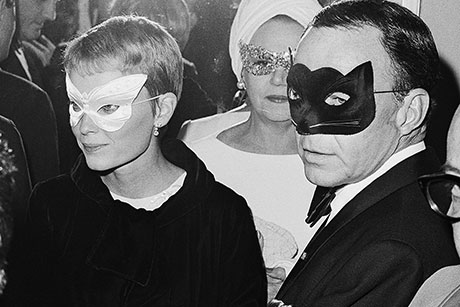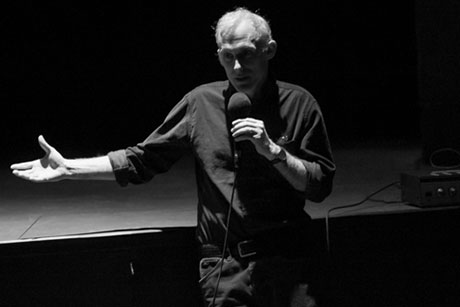Cornell Cinema celebrates 45 years on campus
By Daniel Aloi


With its roots in a campus film society, Cornell Cinema began in 1970 – and a love of movies and a reputation for high-quality, diverse programming have been constants ever since.
Film lovers are invited to celebrate the repertory cinema’s 45th anniversary on campus at the 11th annual Elegant Winter Party – “A Black & White Ball.”
The event, Saturday, March 21 at 8 p.m. in the Willard Straight Hall Memorial Room, benefits Cornell Cinema and is named for its inspiration – a lavish star-studded 1966 affair hosted by Truman Capote at New York’s Plaza Hotel. Black-and-white elements of the party at Cornell include classic scenes projected on four screens, a photo booth and movie memorabilia. Black-and-white attire is encouraged.
Also featured: live music by Annie Lewandowski and organist David Yearsley, faculty members in the Department of Music; door prizes; a cash bar and dancing. DJs Alexander Livingston, assistant professor of political theory, and Merike Andre-Barrett will spin ’outernational’ dance hits from Lagos to Sana’a to Mumbai” on vinyl. Admission also includes a complimentary glass of champagne, catered hors d’oeuvres and desserts.
Tickets are $45 in advance, $55 at the door, $25/$35 for students. Advance tickets are available now at CornellCinemaTickets.com and at 104 Willard Straight Hall starting Monday, March 16 (9 a.m.-5 p.m. weekdays). For those who cannot attend, tax-deductible donations can be made online.
“One thing interesting about Cornell Cinema is that it’s completely integrated into the campus community, but it’s also embraced and supported by the greater Ithaca community,” said Mary Fessenden, who has been with Cornell Cinema for 28 years, the last 20 as its director.
Along with current box office hits, independent and foreign films, documentaries and classics, the cinema hosts numerous programs and film series each year in connection with courses or co-sponsored with student groups, departments and programs such as the Atkinson Forum in American Studies. The cinema itself is a program of the Department of Performing and Media Arts, cosponsored by the Office of the Dean of Students.
Stars from 45
Christopher Reeve ’74 is one of many alumni guests Cornell Cinema has had over the years – stars, screenwriters, directors and technical professionals such as Martin Scorsese’s editor, Thelma Schoonmaker ’61; “The King’s Speech” screenwriter David Seidler ’59 and “Trouble the Water” director Tia Lessin ’86 (all Oscar winners); film editor Tim Squyres ’81; producer Scott Ferguson ’82; Mary Woronov and Ricky Jay. (Ferguson, Squyres and Lessin return for a panel April 25 at Cornell Cinema during Charter Day Weekend.)
Other past visitors include directors Ang Lee, Derek Jarman, Atom Egoyan, D.A. Pennebaker, Charles Burnett, Miranda July and Chantal Akerman; A.D. White Professor-at-Large John Cleese; and Village Voice film critic J. Hoberman with writer-director Todd Haynes in 2008. Emma Stone called in for a conversation with “Easy A” writer/director Will Gluck ’93 in 2010.
Live music has been a regular feature, with silent films accompanied by the Alloy Orchestra, Tin Hat Trio and pianist Philip Carli; and acts ranging from Natalie Merchant and local musicians to Half Japanese, Yo La Tengo and Tuvan throat singers Yat Ka. Silent films have been presented with music in Sage Chapel since 2012.
“Our primary mission is educational, so we wanted faculty to be involved with the 45th anniversary celebration,” Fessenden said.
Faculty members are invited to propose programming, and a Student Advisory Board gives “a lot of input on some of the more popular titles that we show, and helps with series and events,” she said. Alumni of the cinema staff stay connected with the program and current student staff via a Facebook group.
Willard Straight Theatre’s most recent renovation in 2013 added enhancements like digital projection equipment and a new screen. The annual benefit assists with operating expenses. “When Cornell Cinema started in 1970, 90 percent or more of our operating costs were covered by ticket income,” Fessenden said. “Now it’s only 20 percent.”
“During our 45-year history the exhibition landscape has changed so radically,” she explained. “We’ve had to adapt to that. In this day and age there is so much more content out there, and so many more platforms to access that content. So, inevitably, audiences are smaller than they used to be.”
Even with the advent of digital, “we still have 35mm,” she said – a visual experience that will soon be a memory to most moviegoers.
The cinema’s resources include a media arts library, publications and an extensive film and video collection that includes Chuck Workman’s “Precious Images.” That Oscar-winning 16mm montage of classic scenes will be seen at the gala, as will dancers Fred Astaire and Ginger Rogers, silent comedian Buster Keaton, and a selection of Andy Warhol screen tests – last seen here in 2009 at a special event with musicians Dean and Britta, “13 Most Beautiful … Songs for Andy Warhol Screen Tests."
Fessenden says the theater experience is still, “hands-down, the best way to watch a movie – when your complete attention is focused on the film.”
Media Contact
Get Cornell news delivered right to your inbox.
Subscribe